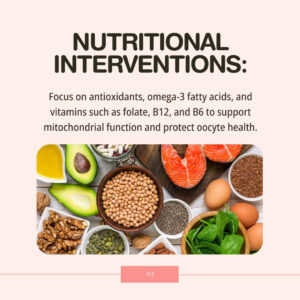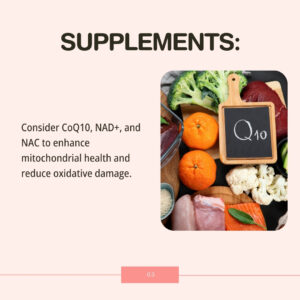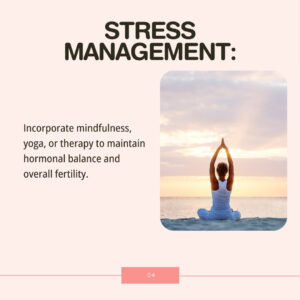Understanding The Importance of Egg Quality
Egg quality plays a crucial role in determining a woman’s fertility. Women are born with all the eggs they’ll ever produce. During fetal development, a female fetus has around 6 million eggs. By birth, the number of eggs decreases to approximately 1 million. By the onset of puberty, only about 300,000 eggs remain.
As we age, the natural decline of the number of eggs we have accelerates, especially once we reach 30 years of age. While the quantity of eggs declines with age, the quality of eggs also decreases, which means they’re more prone to chromosomal abnormalities and other issues, making it more challenging to conceive and carry a healthy pregnancy.
This blog post discusses common misconceptions about egg quality and practical strategies to help optimise egg quality.
The Female Fertility Timeline: Quantity vs Quality
Women’s fertility is often misunderstood as being only about the number of eggs. However, the timeline also underscores not just the quantity but how egg quality changes over time.
Younger women have a higher proportion of good-quality eggs, which decreases significantly with age. By the time women reach their late 30s and 40s, the decline in both number and quality becomes more pronounced, leading to higher risks of chromosomal abnormalities.

What Does Egg Quality Mean?
Egg quality is not just about age; it’s about the oocyte’s capacity to go through the essential stages of maturation, fertilisation, and embryonic development, ultimately resulting in a healthy pregnancy.
At the core of egg quality is aneuploidy—an abnormal number of chromosomes in an egg cell. In humans, a normal egg has 23 chromosomes, which combine with 23 from the sperm to form a healthy embryo with 46 chromosomes. However, errors during cell division can lead to aneuploidy, where eggs may have an extra or missing chromosome. These genetic imbalances can result in issues like developmental abnormalities, intellectual disabilities, and failed pregnancies.
Aneuploidy is a significant contributor to poor egg quality. It affects about 10-25% of eggs in women in their early 30s, rising to over 50% in women over 40. This high prevalence is why age-related declines in fertility are often linked to egg quality.
Additionally, poor oocyte quality is deeply connected to mitochondrial health. Oocytes rely heavily on mitochondria for energy, but over time, mitochondrial function declines, leading to increased oxidative stress and damage to vital cellular components like DNA and proteins. This is a key driver of age-related fertility challenges.
In fertility treatments like IVF, aneuploidy can lead to lower fertilisation and implantation success rates. It is also a leading cause of pregnancy loss and birth defects. While no direct test exists for egg quality, observing embryo development during IVF can provide indirect insights into an egg’s quality.
Can You Test For Egg Quality?
Measuring egg quality is more complex than assessing egg quantity. Unlike ovarian reserve tests like anti-mullerian hormone (AMH), which measure the number of eggs, no biochemical or biophysical tests directly evaluate egg quality. This makes reduced quality harder to diagnose than decreasing numbers.
Egg quality varies significantly even within the same individual. Research has shown that key regulatory genes involved in oocyte development can have 3- to 5-fold differences in expression among oocytes from the same patient.
Moreover, age-related declines in egg quality result from a reduction in the proportion of good-quality oocytes. Despite this decline, any given ovary typically contains a mix of both good- and poor-quality eggs. This variability underscores why egg quality cannot be measured as a collective trait but requires evaluation at the individual oocyte level.
IVF provides one of the best opportunities to assess individual oocyte quality. Embryos that reach the blastocyst stage and test as euploid (chromosomally normal) are considered products of good-quality eggs. However, this evaluation occurs after fertilisation, meaning it does not directly measure the quality of unfertilised eggs.
Can You Improve Egg Quality?
While there is no guaranteed way to improve egg quality, supporting overall egg health is an essential first step. Research suggests that targeted interventions can help create a more favourable environment for oocytes to develop and thrive.
- Lifestyle Adjustments: Avoiding smoking, limiting alcohol, and reducing exposure to environmental toxins are critical in minimising oxidative stress and supporting cellular health.

- Nutritional Interventions: A nutrient-rich diet that includes antioxidants, omega-3 fatty acids, and vitamins like folate, vitamin B12 and B6 can enhance mitochondrial function and protect oocytes from oxidative damage.

- Supplements: Supplements like CoQ10, Nicotinamide adenine dinucleotide (NAD+) and N-acetylcysteine (NAC) have shown promise in supporting mitochondrial health and reducing reactive oxygen species.

- Stress Management: Chronic stress can disrupt hormonal balance, so incorporating mindfulness, yoga, or therapy into your routine is essential for supporting overall fertility.

Focusing on overall health and making informed lifestyle and nutritional choices can improve your chances of achieving a healthy pregnancy.
To learn more about fertility-friendly foods, visit our previous blog post here.
Bottom Line
- Egg quality is vital for conception and is influenced by chromosomal health and mitochondrial function.
- Women after age 35, the proportion of good-quality eggs declines, raising fertility risks.
- Targeted nutrition, an antioxidant-rich diet, and strategies to reduce oxidative stress can help protect and support egg quality.
